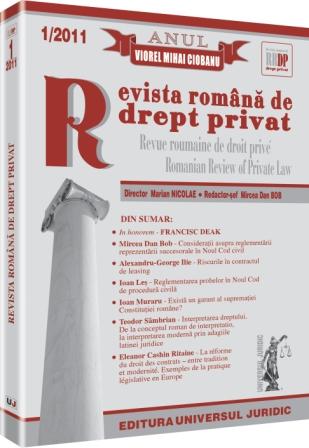Reglementarea probelor în noul cod de procedurã civilã
Regulation of evidence in the new code of civil procedure
Author(s): Ioan LeşSubject(s): Law, Constitution, Jurisprudence
Published by: Universul Juridic
Keywords: new Code of Civil Procedure; evidence; admissibility; consent; management; appraisal
Summary/Abstract: The new Code of Civil Procedure, adopted by Law no. 134/2010, promoted a new conception of evidence in civil matters, giving up their dual regulation, in both the Civil Code and the Code of Civil Procedure respectively. We judge this solution salutary, as evidence belongs to civil or criminal proceedings in their entirety, issue consistently reported by the doctrine of last decades. In fact, in civil matters, the evidence is only a means of supporting law, of laying stress on it, and not a component of substantive law. The study hereby does not perform an exhaustive research of evidence regulation method in the new Code of Civil Procedure, hardly achievable undertaking within a common study in a professional magazine. Therefore, the author gives us just some relevant reference points related to innovations brought by the new procedural legislation in the matter insomuch substantial of evidence means. The author’s research does not relate only to the means of evidence covered under the new Code of Civil Procedure, but also to some of their general requirements for admissibility. The author points out that the legislature has taken over part of the current regulations, concurrently promoting innovative solutions in terms of some means of evidence, such as documents and material evidence. The authors of the new Code of Civil Procedure did not ignore the regulations promoted under the newest codes of civil procedure adopted in recent decades, either, such as the French, the Spanish, the Swiss or even the Canadian province of Quebec codes. The author performed a more thorough analysis in relation to new evidence means, such as documents on IT support, electronic documents and to the material means of evidence, focusing on issues involved in their probative value. Interesting approaches are set forth in terms of confession, as well, a traditional means of evidence, in relation to which the legislature has conferred upon, expressly, indivisibility. The author concludes at the end of his study that the new „architecture” of the probative system may contribute, through joint efforts of the judge and the parties, to enhance the quality of the judicial act
Journal: Revista Română de Drept Privat
- Issue Year: 2011
- Issue No: 01
- Page Range: 82-111
- Page Count: 30
- Language: Romanian
- Content File-PDF

